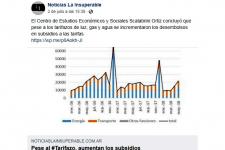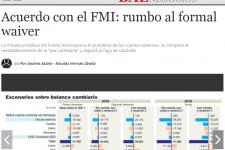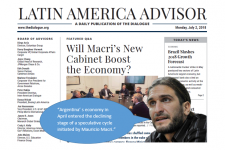El CESO en los medios

El Centro de Estudios Económicos y Sociales Scalabrini Ortiz concluyó que pese a los tarifazos de luz, gas y agua se incrementaron los desembolsos en subsidios a las tarifas.
Por la Redacción de Noticias La Insuperable

Acuerdo con el FMI: rumbo al formal waiver
La mirada ortodoxa del Fondo menosprecia el problema de las cuentas externas. Se complica el reestablecimiento de la "pax cambiaria" y seguirá la fuga de capitales
Por Andres Asiain - Nicolás Hernán Zeolla

Andrés Asiain, director of Centro de Estudios Económicos y Sociales Scalabrini Ortiz in Buenos Aires: “Argentina’s economy in April entered the declining stage of a speculative cycle initiated by Mauricio Macri. The exchange rate run pushed Macri to ask for stand-by credit from the IMF, which comes conditioned by cuts in public spending and a policy of a free-fl oating exchange rate that has caused an even greater devaluation of the peso, as well as a drop in real wages and domestic consumption. It’s a combination that contracts the domestic market, which has already been hit by interest rates that are among the highest on the planet. Facing the prospect of a production crisis, the government aims to recompose parts of its relationship with the business community through changes to sectoral policies. The removal of the minister of energy points to containing price hikes for fuel and utilities, which drown the productive sector. The new minister of production also has links to the business community. Caputo’s appointment to the central bank is related to the previous chief’s mala praxis. But, at the same time, it speaks to Caputo’s relations with international banks and funds holding Argentine paper that want to use the IMF credit dollars in order to sell, thus transferring fi nancial losses from the foreseeable crisis to that body. There’s nothing more strategic for that than Macri appointing his own man to control the central bank, which administers international reserves that have been padded by the IMF’s loans.”
- ‹ anterior
- …
- 401
- 402
- 403
- 404
- 405
- 406
- …
- siguiente ›






